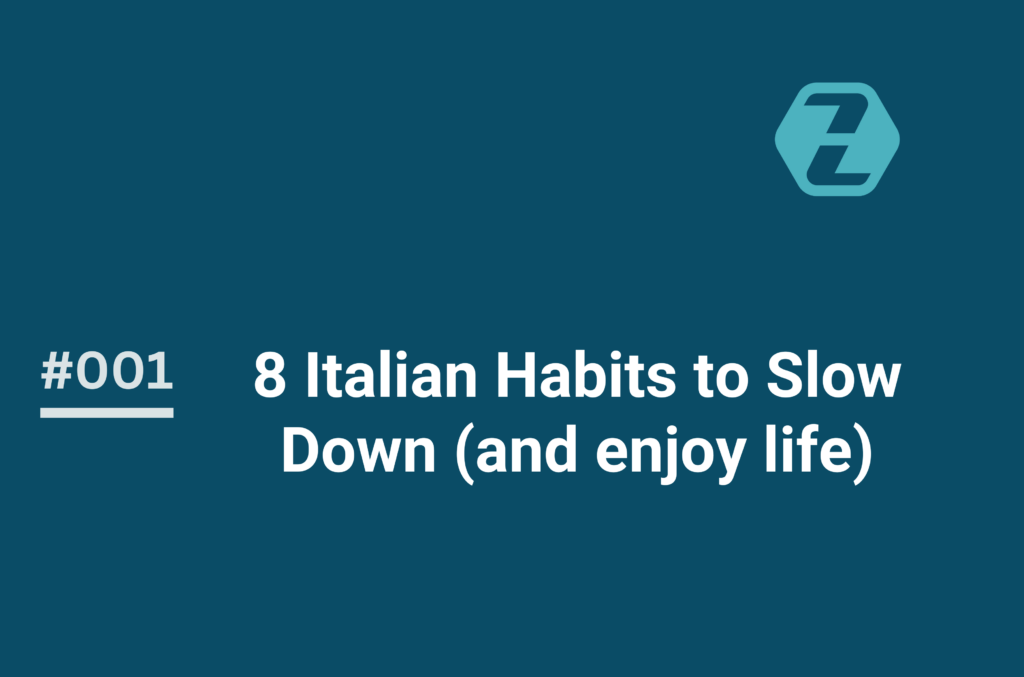Today, I will show you how to slow down and enjoy life by stealing 8 Italian habits.
If you can successfully integrate even one of these habits, you’ll reduce anxiety, improve your mental health, and begin to better enjoy time with family, friends, and yourself.
Unfortunately, most unhappy people will glance over this article and continue to stick to their normal routine. They will continue to be confused, unfulfilled, and stuck. They will continue to be cemented to daily rituals simply stressing them out.
We are missing out on life because don’t take time to slow down and pay attention.
There are zero hacks or tricks in this issue. These changes will be difficult but potentially life-changing regarding how you think and act. Italian people generally:
- Focus on family
- Walk
- Prioritize quality
- Practice “Dolce Far Niente”
- Are socially involved
- Have a positive outlook
Here’s your action plan for the next 60 days to significantly improve your life and happiness. Let’s dive in.

Week 1: Focus on Family
Live longer and be happier. That’s what a strong family connection can deliver. For this week, try to focus on being present with family.
A particularly memorable family I visited in the Blue Zone of Seolu in Sardinia had four generations living under one roof. Dinners were non-negotiable and involved wine from the grandfather, vegetables or meat from the father, and some baked items from the wife, topped off by ample involvement from the children and grandchildren.
There was something non-tangibly magical to it, and, of course, there were the tangibles:
- Respect and care for elders
- Family Meals
- Ample Support System
- Social Identity
- Generational Education
The people of Seolu have 1000% more centenarians per 1000 people (20) than the US (2).1 Lack of social connections, when factoring in multidimensional analysis, increases the odds of mortality by 91%.2,3
Here are some ways to focus on family like Italians:
- Family Meals: Aim for close family meals five times a week and large family meals once every two weeks
- Family Traditions: create seasonal traditions that everyone can look forward to. One Italian example I love is around the end of summer, everyone, from grandparents to grandkids, comes together to make sauce from tomatoes to preserve them. Create your own. Like a summer camping trip, seeing Christmas lights, or Halloween pumpkin picking.
- Look out for each other: As Tony Soprano says, “Family. They’re the ones you can depend on.”
- Celebrate Achievements: Win as a family!
Week 2: Walk Everywhere
In many Italian towns, cars won’t fit. Yes, even the clown cars. People walk more to dinner, from school to a friend’s house, from the beach. This week, try to walk or use your body’s energy to get to and from places.
Walking decreases the risk of cardiovascular and cerebrovascular disease, type 2 diabetes, and dementia and improves mental well-being, sleep, and longevity. Walking briskly for 30 minutes 5 days a week can cause a multitude of benefits.4
Go on walks in nature with your family at sunrise for the most benefit, but any time of the day will do. Biking, swimming, rowing, and other outdoor sports also qualify.
Week 3: Piano, Piano
“Piano” most commonly means “floor” in Italian; however, when you stack the two, it usually means to go slowly or “step-by-step.”
This is one of the most impactful ideologies from Italian culture and one of the most difficult for Americans to adopt. We are always rushing and trying to be efficient, but why?
Most Italians never rush.
For this week, try to go slowly like an Italian:
- Eat one meal daily with friends or family for at least one hour at the table with no phone.
- Have a passeggiata, or evening stroll, twice a week through the city, park, or anywhere nice as the sun sets.
- Pick one day of the week to have nothing on the calendar other than a 2-hour lunch or dinner and 1 hour stroll; see where the day takes you.
Week 4: Enjoy Leisurely Meals With Friends
It’s so simple yet so impactful. This week, it’s your job. Who are your three to five closest friends? When did you last have a no-rush, no-business, no-double-date-with-a-wierd-hinge-person dinner?
For this week, arrange a dinner with your friends and make the rule of no phone. Also, the rule is to sit at the table for at least 2 hours and go for a walk afterward. A Friday, Saturday, or Sunday are good options here.
Week 5: Cook Something Just For You
What do you like to eat? What is your comfort meal? Have you ever cooked anything before? Easy mac doesn’t count.
Italians often buy their food from several places: the garden or farm, the butcher, La Formaggeria (the cheese shop), the Pannetteria (bakery), or the normal grocery store. However, this is usually a daily occurrence.
Here are some of my favorite simple Italian recipes:
- Caprese Salad
- Spaghetti con Ragu (don’t say “Bolognese!” the people of Bologna will have you sleeping with the fishes)
- Simple Risotto
Week 6: Il Dolce Far Niente
The sweetness of doing nothing.
Picture yourself in the Tuscan countryside, the sun setting on the rolling hills in front of you. You have a fantastic Chianti in one hand, a hunk of fresh bread in the other, and a plate of Olive Oil next to you. Five ingredients (Yeast, water, flour, grapes, olive), and your life is changed.
For this week, pick one hour a day and one whole day to do nothing. Disconnect and focus on simple activities like eating, walking, sitting, or chatting. Let this activity take up as much time as possible, and you will notice a bit of magic.
In one of my favorite books, Walden, Henry David Thoreau leaves normal life to live in a cabin by a lake for two years. He finds it life-changing, “When we are unhurried and wise, we perceive that only great and worthy things have any permanent and absolute existence, that petty fears and petty pleasures are but the shadow of the reality.”
Week 7: Join the Community
In the late 19th century, hundreds of immigrants from Roseto, Italy, established a new home in Pennsylvania they called “Roseto.” No one under 55 in this town showed any signs of heart disease—a stark difference from the US. Men over 65 in Roseto died from heart disease at a rate half that of the US population. The only environmental difference? The community. The effect was so strong that this health phenomenon was called “The Roseto Effect,” popularized by Malcolm Gladwell’s book Outliers.5
Ways to join the community:
- Attend local events, fairs, meetups, and markets. Bring some friends who knew these people lived right next to you.
- Join a local class, interest group, or professional association (I recently started to Tango).
- Volunteer at nonprofits, schools, libraries, beautification projects, or neighborhood improvements.
Week 8: Embrace the Sweet Life
One of the most famous Italian expressions is, “La Dolce Vita,” or, “The Sweet Life.”
Even implementing one of the above weeks can dramatically improve your awareness of the movement of life. Many of us are very lucky for many reasons. However, we must often be prompted by a scary documentary or news article to realize how good we have it. What about trying to notice the awesome things without any prompting?
Notice the sweet parts of your life. They are there, I promise.
Summary
- Aim for five family meals a week with one being a large extended family meal
- Walk 30 minutes at least 5 days a week (bonus if with family and at sunrise)
- Go Piano Piano, do something slowly once a day
- Arrange a friends dinner, you are in charge
- Cook a meal just for yourself, try and minimize extra ingredients
- Do nothing for one hour, you can do that
- Attend one local event or class
- Practice Gratitude by writing two things down every morning that you are grateful for in a Journal
Sources
- https://www.unionesarda.it/news/seulo-il-paese-piu-longevo-del-mondosoprannomi-e-segreti-del-paese-dei-record-s3w90ecz
- MG Marmot, Status syndrome: A challenge to medicine. JAMA295, 1304–1307 (2006).
- J Holt-Lunstad, TB Smith, JB Layton, Social relationships and mortality risk: A meta-analytic review. PLoS Med 7, e1000316 (2010).
- Ungvari Z, Fazekas-Pongor V, Csiszar A, Kunutsor SK. The multifaceted benefits of walking for healthy aging: from Blue Zones to molecular mechanisms. Geroscience. 2023 Dec;45(6):3211-3239. doi: 10.1007/s11357-023-00873-8. Epub 2023 Jul 26. PMID: 37495893; PMCID: PMC10643563.
- Gladwell, Malcolm. Outliers. Back Bay Books, 2009.
